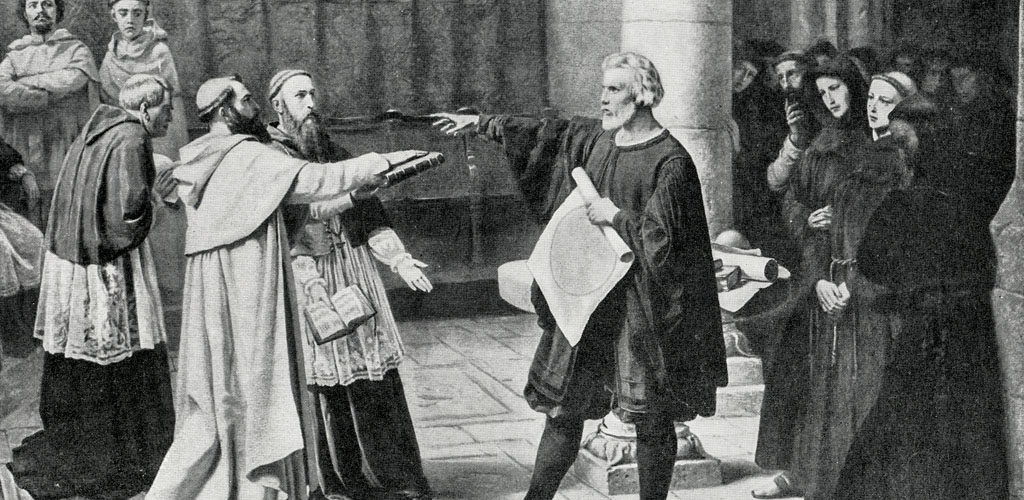Review: On Trial for Reason: Science, Religion and Culture in the Galileo Affair by Maurice Finocchiaro
The Galileo affair, writes Maurice Finocchiaro in his history of the event and its aftermath, lends itself to myths, one being that it is the archetypal example of the eternal conflict between science and religion, an example of the Church rejecting evidence because it is stuck in its ways and fears losing power. Another, revisionist but less-widely held myth is that the affair was all about Galileo’s combative personality and rivalries within the Church’s hierarchy. Finocchiaro argues that the truth is somewhere in the middle.
It is true that Galileo was involved in a number of battles with colleagues in his lifetime, but Finocchiaro argues that Galileo was a model of reasonable and critical thinking, open to other points of view, as is evident from the dialogue form he used to present the case for Copernicus’s theories of the Earth revolving around the sun, against the orthodox view of the planets and stars revolving around the Earth. (I think, though, that Galileo’s protest that he was just discussing both sides of the argument fairly is somewhat disingenuous – he was obviously trying subtly to forward the Copernican argument.) Finocchiaro discusses the machinations of various patrons, and says that it was all complicated, but not that complicated. In the end, it was still an argument over science. While science and religion are not necessarily in conflict, in this case they were. Sort-of.
But it was not just a matter of the Bible conflicting with scientific evidence. The Bible was simply another layer of confirmation on top of centuries of understanding refined since the ancient Greeks. It was as much about one scientific theory against another, and about scientific method. It was not illogical or unreasonable to believe in geocentrism. Galileo himself had rejected Copernicanism earlier in his astronomical career and it was only after making observations through his telescope that he changed his mind.
The orthodox view was that it was fairly obvious that the heavenly bodies moved around the Earth. If the Earth moved, we’d be able to feel it. Because of centrifugal force, a revolving Earth would fling untethered objects, including people, out into space. The arguments against Copernicus were complex (thinking of people at the time as ignorant flat-earthers is itself ignorance). The idea of the Earth orbiting the sun went against extraordinarily rich philosophical conceptions, involving the temporality of the Earth compared to the eternal nature of the heavens, and circular versus linear movement (orbital movement of the heavenly bodies was part of, not contrary to, the sophisticated argument for the perfection of the heavenly spheres). Finocchario reminds us that it was therefore reasonable at the time to be wary of Galileo’s unorthodox ‘evidence’.
One of the most interesting aspects of the story, I think, and one that illuminates from an odd angle the complex nature of scientific debate at the time, is that Galileo rejected the lunar attraction explanation of the tides, which was put forward by his contemporaries, because he didn’t know about gravity and thought the moon invisibly influencing water at a great distance was simply akin to magic. Instead, he thought that the combination of the Earth’s yearly orbit and its daily rotation somehow combined to make alternating acceleration and deceleration that caused oscillations in large bodies of water. This was typical of his way of thinking, but the fact that he was wrong says something interesting about the relationship of observation, theory and fact.
Part of the problem for Galileo in his relationship to the Catholic Church was the role of observation compared to scripture, and whether observation should be privileged if it contradicted scripture (in this case, a very literalist reading of Ecclesiastes 1 and Joshua 10). This was not a new argument – Saint Augustine had wondered about the same issue. Although Galileo tried to avoid the religious side of the debate, he was making a theological argument – that if observation contradicts scripture, we might have to rethink our interpretation of scripture. Of course he was right, and centuries later, Pope John Paul II, in an attempt to rehabilitate Galileo’s reputation within the Church, agreed, as had Augustine centuries earlier.
This issue of how literally to take the Bible, and how that relates to our observations of the natural world, was not only not new to Galileo’s time; of course, it remains an issue in our own day.
Nick Mattiske blogs on books at coburgreviewofbooks.wordpress.com













